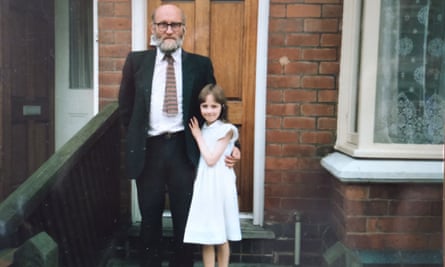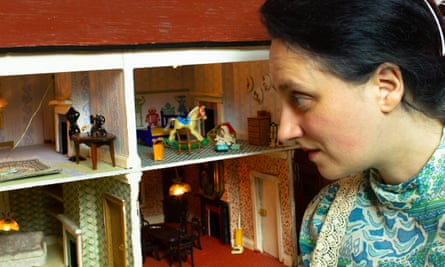My father was an alcoholic; and when you grow up with an alcoholic, you get used to them pissing in places they shouldn’t. In the street, as the neighbours tut; in wardrobes; on my bed, while I was in it. He could never find his way to the bathroom in the dark.
When I was around nine, I awoke one night to him shouting from the landing: “Look at this!” I kicked off my duvet, with its peach Laura Ashley print, and crept round my door. At 5ft 4in, he was a stocky, small man – though not particularly small to me. He had a beard that every so often he savaged with nail scissors, giving it an uneven, mangy appearance, but when it was long a friend compared it to George Bernard Shaw’s. This was a name I knew, vaguely, because we had many books in the house; my father read extensively.
I could see him now in the dim hall, apparently having slept in his shirt. My mother was at her doorway. We both followed him into the room where he had his own single bed. The harshness of the overhead light made us blink. He pointed, outraged, at an Anglepoise lamp that crackled and spat on the floor. We watched it combust.
“Look at that!” he shouted again. I felt he was asking for an explanation. He was drunk and confused and, while searching for someone to blame for the fire, overlooked his own responsibility. He’d urinated on an electrical appliance. Failing to injure himself was a stroke of good fortune. I was overtaken by uncontrollable laughter. My mother laughed, too.

If asked whether the situation had scared me, I would have said no. It was funny. Yet all through my childhood I slept badly, and I don’t wonder why. Even when sober, my father had a tendency to alter the house without warning. Once my mother came downstairs for breakfast, to find him knocking down the wall between the living room and the kitchen. This wasn’t done without skill; he was a building site labourer. But he had a pattern of breaking things, suddenly. He smashed my mother’s crockery collection. He hit people, too – drinkers in the pub; the school head; my mother. My older sister and brother weren’t exempt.
I was the only member of the family he didn’t hit, partly protected by being the baby, and partly by the extreme caution I cultivated. My laughter in his bedroom that night was rare. Strangers said I was an aloof little girl, or called me self-contained. I underreacted to everything, careful not to challenge him (he hated to be challenged) and to limit any excess of emotion: no anger, and no excitement, either. I was watchful, as we all were, for the subtle changes in his bearing that signalled his bad mood. This spared me physical harm, but it didn’t spare me the atmosphere.
Like my father, I was a reader. Usually I read stories, but one day I found a glossy book in the grown-up section of the library. The book was about Queen Mary’s dolls’ house. I was fascinated, because I wanted to shrink; small enough to disappear into a dolls’ house, small enough to evade detection. The nine-year-old me began making miniature items from everyday objects. A tiny logo on a KitKat wrapper, cut and wrapped round some foil, became a doll-sized chocolate bar. With my mother’s camera, I photographed my books at the correct distance to create an entire library of small dust jackets. And I asked my father if he would build me a dolls’ house.
At first I had no specific requirements. We travelled to Ireland, where my father was from. While there I commented that the doors were very wide, and he replied with surprise that he always found English doors narrow. I now know that many of the changes he made to our own home, inexplicably and without discussion, were an attempt to render our Birmingham terrace more like the Irish farmhouse he grew up in. Our house felt unsafe, emotionally if not structurally; maybe I sensed that he didn’t fit there, either. I never asked him to replicate our house in miniature. Instead I chose a bed and breakfast we stayed in near Newgrange – a vast but typical Irish cottage, with white walls and green window frames.
I don’t know how long the dolls’ house took to make. The things I remember are my father’s hand-drawn plans, and a dedication to detail that now makes my heart ache. He simply wanted to make me something beautiful. I watched him struggle to hang each small door. Anxiously, I assured him I didn’t mind if the doors didn’t open; but he persisted till they were in place, glazed the windows and drilled holes for electric lights. At the back he created a secret room that could only be accessed if you knew it was there. For years, I hid my diary inside.
When the house was complete I papered the walls with gift wrap and used table mats as rugs. I made my own dolls from clay and wire. As I strung their limbs together, a babysitting neighbour commented on my handiwork: who was going to live in my dolls’ house?
“A mother and her children,” I said firmly.
She hesitated. “Not a daddy doll?”
“No.”
“Why not?” The neighbours knew what my father was like; he routinely forgot which was his house and attempted to unlock other people’s doors, shouting and swearing when he couldn’t get in. But he was also entertaining company and throughout his life he was popular. The local opprobrium was directed at my mother, who was occasionally shunned for not keeping him in line.
“Why not a daddy doll?” the neighbour persisted. I shrugged and wouldn’t be moved. He had built me an exquisite house. I still wanted to keep him out.
***
The dolls’ house outlasted him. My father died suddenly of a heart attack when I was 22. Three hundred people attended his funeral; the church was standing room only. My aunt came from Ireland and marvelled at the dolls’ house. She hadn’t known he was creative.

As a boy, they knew he was clever, good at maths and science. His parents hoped he’d become a doctor. The plan proved too expensive and he studied engineering. Afterwards he struggled to hold down white-collar work; on a building site you could punch someone and they didn’t fire you. Some of his violence looked like self-sabotage – he’d ruined his prospects and his marriage so thoroughly it could seem deliberate. After the divorce, my brother was on good terms with him and my sister assented to a truce. Neither thought he had mellowed. He was now the one suffering most for his actions.
In the final years of his life, my relationship with him remained cordially cautious. We kept conversation to books, and talked about Georges Perec or Isaac Babel or Jaroslav Hašek. I inherited his terrace, where I would find cash squirrelled under the floorboards or at the backs of cupboards. He’d never trusted banks. Nor had he trusted that his telephone conversations went untapped. It was hard to tell how much this paranoia was understandable; he’d been beaten and harassed by the police, like many Irish people in Birmingham. Once he was held for two days without representation. But there were other explanations for his mood swings and suspicion. His younger brother had schizophrenia, and he once told me his mother was bipolar. At 33, I was diagnosed with bipolar disorder myself and sat numb in a corridor, reading a patient leaflet that seemed to describe my father, rather than me.
His departure meant he didn’t see my marriage, or the award of my doctorate, or the publication of my first novel. I’d chosen to write speculative fiction, because it was easier to avoid writing about my own history if I was imagining alternate worlds. It wasn’t a failsafe strategy. I’d maintained my love of dolls’ houses, continuing to collect them and building my own. My agent suggested a dolls’ house story for my second novel, and the idea appealed. I drafted a tale; it was supposed to be a mystery, but it became another sort of story. It turned out I couldn’t write about dolls’ houses without writing about fathers and daughters.
My father disapproved of writers airing grievances with their parents in literature. He thought it was a betrayal. I raised this during therapy, feeling that he wouldn’t forgive me. “We can imagine,” my therapist said, “that if your father were still alive he might be wiser now.” I didn’t find this plausible. And yet there’s a precedent for his forgiveness. My father never asked why there was no daddy doll in the house he had made; he let me erase him without comment, accepting it as his due. Recently my sister suggested this was because he loved me. “He looked at you as if he’d never imagined anyone like you,” she said. “He looked at you as if you were the most precious thing.”
• The Thief On The Winged Horse by Kate Mascarenhas is out now, published by Head of Zeus. To order a copy for £16.52, visit the Guardian Bookshop
from Lifestyle | The Guardian https://ift.tt/2Lq2RDL
via IFTTT

comment 0 Comment
more_vert